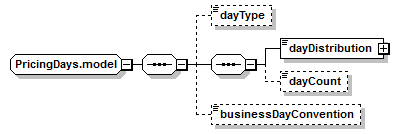
Namespace: |
|
Content: |
4 elements |
Defined: |
globally in fpml-com-5-7.xsd; see XML source |
Includes: |
definitions of 4 elements |
Used: |
at 1 location |

Complex Content Model |
|
<xsd:sequence>
<xsd:element minOccurs="0" name="dayType" type="CommodityDayTypeEnum"/>
<!--View Generation: Removed a degenerate choice.-->
<xsd:sequence>
</xsd:sequence>
</xsd:sequence>
</xsd:group>
|
Type: |
BusinessDayConventionEnum, simple content |
|
enumeration of xsd:token
|
Enumeration: |
|
Type: |
xsd:positiveInteger, predefined, simple content |
Type: |
CommodityFrequencyType, simple content |
|
xsd:normalizedString
|
maxLength: |
255
|
Type: |
CommodityDayTypeEnum, simple content |
|
("Business" | "Calendar" | "CommodityBusiness" | "CurrencyBusiness" | "ExchangeBusiness" | "ScheduledTradingDay") | ("GasFlow" | "NearbyContractDay")
|
|
XML schema documentation generated with DocFlex/XML 1.9.0 using DocFlex/XML XSDDoc 2.8.0 template set. All content model diagrams generated by Altova XMLSpy via DocFlex/XML XMLSpy Integration.
|